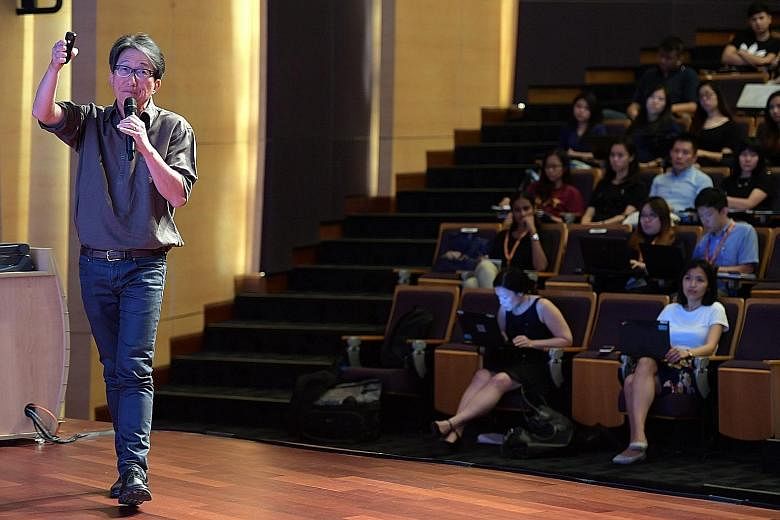Manpower Minister Lim Swee Say yesterday declared that the idea of doing the same job for life is obsolete.
In tomorrow's working world, employees will be required to pursue different careers throughout their working life, he said.
The reason: As companies and the economy restructure, sometimes forced by disruptive technology, workers will have to adapt and continually learn new skills.
Mr Lim painted this picture of the future economy to 150 students and guests at the annual Kent Ridge Ministerial Forum held at the National University of Singapore last night.
Offering his advice on how they could stay employed and do well, he said: "You must be prepared that you might have to change from one career to another... even if you continue working for the same employer."
He cited the example of a company that was moving into advanced manufacturing and needed fewer engineers but more data scientists.
"This company told its engineers and technicians, 'Instead of our retrenching you, why doon't we retrain you to become data scientists?'" he recalled.
Under the Professional Conversion Programme, the Government gave funding for the engineers to be trained in data analytics.
It was one of the ways the Government was helping Singapore workers adapt to changes, said Mr Lim, as he urged students to stay versatile while pursuing their passions.
Mr Lim set the theme for the evening with a question on many young minds: "As students, you must be worrying - by the time you enter the workforce, will there be enough good jobs for all of you?"
Pointing to the Singapore economy, he noted that it was undergoing rapid transformation, amid slower workforce growth and a push for greater productivity in order to continue growing the economy.
One way to overcome these "bottlenecks" in manpower and productivity is to adopt technology and automate.
This will help produce good jobs but it requires workers to stay nimble and flexible, Mr Lim said.
At the forum yesterday, being adaptable was a key focus.
During the question-and-answer session, a student wanted to know what workers of the future need.
It is important to be open to change, Mr Lim said.
Citing his own university and career experiences, he recounted that he had to study management, economics and human resources while studying for a degree in electronics, computer and systems engineering in England.
He returned to be a computer engineer at the Defence Ministry, but his career has seen him holding posts at the then National Computer Board and the Economic Development Board before he entered politics in 1996.
Gone are the days when a single employer would take care of a worker for his entire life, he added.
When asked whether increased automation would displace jobs, Mr Lim said that adopting it would help Singapore remain competitive by raising productivity.
A student who said he had seen foreign workers living in "abysmal" conditions asked what Singapore was doing for their welfare.
Mr Lim replied that the authorities send inspectors regularly to inspect foreign worker dormitories. Also, workers injured on the job would be compensated because of mandatory insurance.
He also asked the student to write to him if he knew of workers living in dismal conditions.
"I want to assure you that we take the welfare of foreign workers seriously," said Mr Lim.


